IJCRR - 7(9), May, 2015
Pages: 71-77
Print Article
Download XML Download PDF
ATTITUDE OF PHYSIOTHERAPY STUDENTS TOWARDS DISABLED PERSONS
Author: James Ghagare, Akshay Oswal, Rachana Dabadghav, Nilima Bedekar, Ashok Shyam
Category: Healthcare
Abstract:Abstract Body: This study examined the attitudes of physiotherapy students towards persons with disabilities in Maharashtra. The Scale of Attitudes toward Disabled Persons (SADP) was sent to 1000 physiotherapy students all over Maharashtra and with a response rate of 40.8%, 408 students including 300 female and 108 male students completed the survey. Given that physiotherapists play a vital role in providing information, support and rehabilitation to persons with disabilities, a greater understanding of their attitudes toward this segment of the population will support efforts to implement appropriate interventions. Results and Conclusion: It was concluded after this study that physiotherapy students hold a moderately positive attitude towards disabled persons and perceived disabled persons as quite similar to non-disabled persons.
Keywords: Attitude, Disabled persons, Physiotherapy students
Full Text:
INTRODUCTION
The ATDP was developed by Yuker et al.1 The ATDP-Form O, used in this study, has been shown to be internally consistent, stable, and reliable, with split–half reliability coefficients ranging from.75 to.85, and test-retest reliability values of.66 to.89.2This scale takes about 5 minutes to administer and consists of 20 items pertaining to persons with disabilities. The scale was sent to physiotherapy students from second year at bachelors’ level as well as post graduate students with an age group of 19-24 with a standard deviation of 1.45. According to the World Health Organization (WHO), 7 to 10% of the populations in developing countries live with some form of disability3 . The state of Maharashtra offers an undergraduate and post graduate physiotherapy programme. The programme aims at training competent physiotherapists who can address the needs of people with disabilities. Therefore it is important to ensure that the perceptions of physiotherapy students towards disability are appropriate. The quality of medical and rehabilitation services is influenced by the attitudes of health care professionals toward persons with disabilities. If physiotherapists have misconceptions about disability or have limited experience and knowledge about managing disability, this could negatively impact on the quality of services provided to persons with disabilities. Physiotherapists play an influential role in determining the priorities and direction of rehabilitation services. The quality of rehabilitation services is influenced by the attitudes of physiotherapists toward persons with disabilities. The reason why this study was conducted was to find out what the attitudes of physiotherapy students towards disabled persons is. There has been some study on the extent to which personal attributes influence attitudes towards persons with disabilities. Most studies observed that women hold more positive attitudes than men. Several studies have compared the attitudes of health professional students across professions. Tervo et al4 and Garven and Stachura5 , whilst comparing nursing, physiotherapy and occupational therapy students, found that nursing students held the least positive attitudes, whereas occupational therapy students showed the most positive attitudes toward persons with disabilities. A bet ter understanding of the multidimensional and intricate relationship between knowledge, attitudes, and behaviour would permit policy-makers and health professionals to design intervention strategies to change attitudes towards persons with disabilities and improve medical and rehabilitation services.
MATERIALS AND METHODOLOGY
The SADP was sent to 1000 physiotherapy students all over Maharashtra by email. The SADP is a questionnaire containing 20 questions. All students at second year bachelors’ level till post graduate level were included in the study. The first year students at bachelors’ level were excluded from the study since they have no exposure to patients at this stage. A written consent was taken from all the participants and the study was approved by the Institutional Review Board. The data was then analyzed using Microsoft Excel.
RESULTS
A total of physiotherapy students completed the questionnaire, providing an overall response rate of 40.8%. The mean age was 20.9years. Just over three fourth of the respondents were female 75%. Given that the majority of the students were females, the attitudes of females in this study may simply be a reflection of the attitudes of female physiotherapy students The respondents perceived the disabled persons as similar to non disabled ones. The attitude of the respondents can be said to be moderately positive, since the average score of the attitudes of the respondents was 23.04 out of a maximum achievable score of 40.
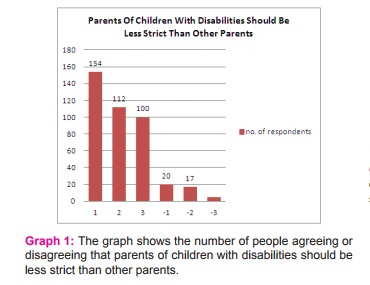
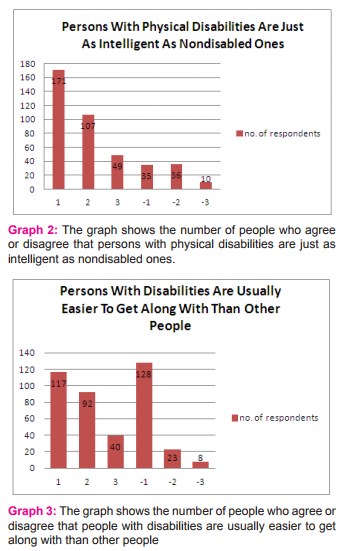
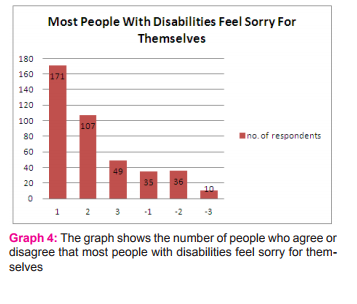
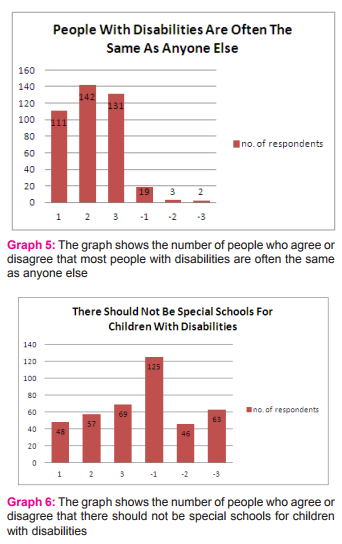
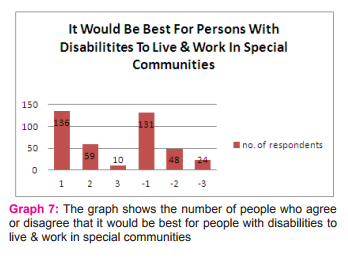
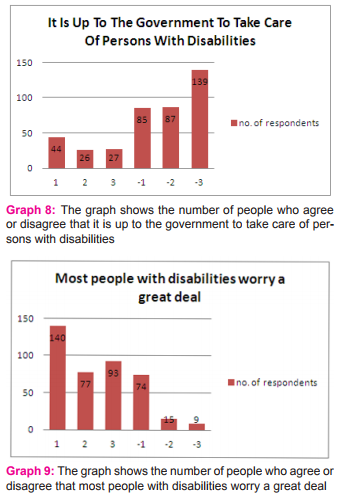
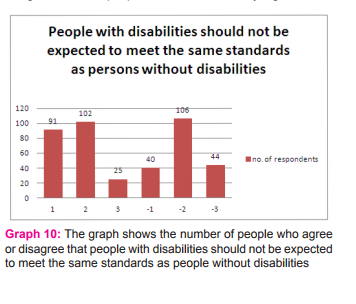
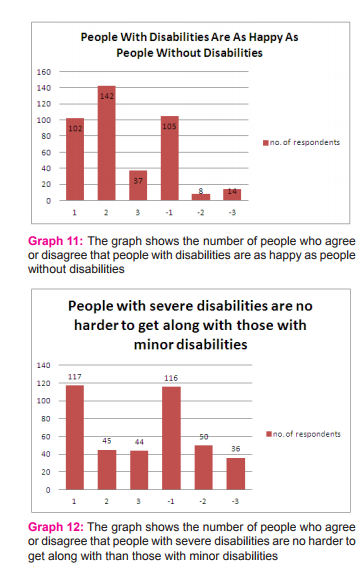
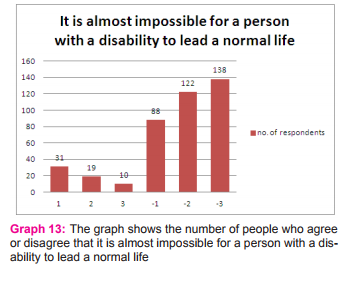
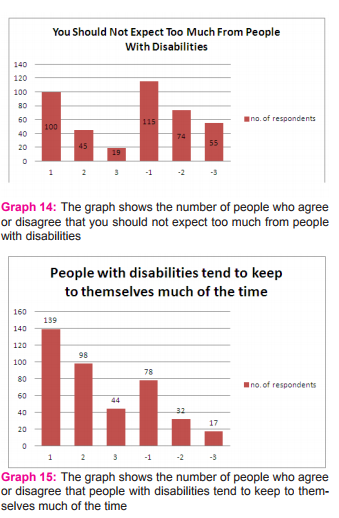
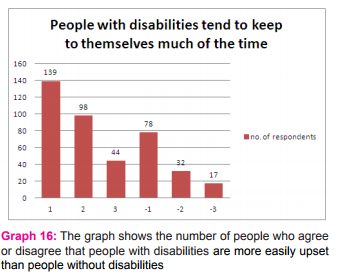
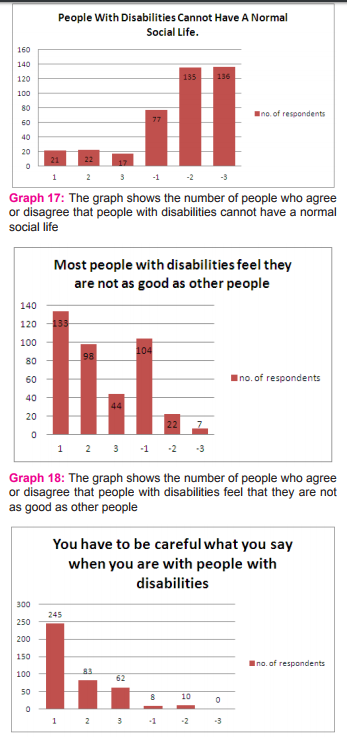

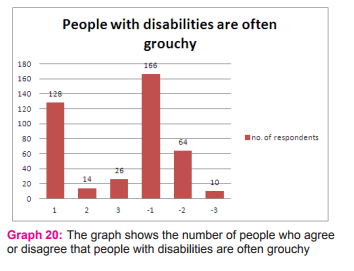
DISCUSSION
Physiotherapy students had significantly a positive attitude toward persons with disabilities on total SADP. Although most studies conducted in Europe and North America observed that older people showed more positive attitudes than younger ones; according to Bakheit Am Shanmugalingam6 , older people in south India expressed less positive attitudes than younger people toward persons with disabilities. It may be that a factor related to Asian culture has some negative influence on the attitudes of older people.
Q1- Parents of children with disabilities should be less strict than other parents 366 of the students gave a positive response as most of them feel that parents of children with disabilities should be less strict than other parents.
Q2- Persons with physical disabilities are just as intelligent as nondisabled ones 327 students gave a positive response since they felt that persons with physical disabilities are just as intelligent as nondisabled ones.
Q3- Persons with disabilities are usually easier to get along with than other people 249 students gave a positive response since they felt that persons with disabilities are usually easier to get along with than other people. But on the other hand the remaining 159 students felt that persons with disabilities are not usually easier to get along than other people.
Q4- Most people with disabilities feel sorry for themselves 327 students gave a negative response since they felt that people with disabilities feel sorry for themselves whereas 81 of the students gave a positive response since they felt that people with disabilities do not feel sorry for themselves.
Q5- People with disabilities are often the same as anyone else 384 of the students gave a positive response since they feel that people with disabilities are often the same as anyone else.
Q6- There should not be special schools for children with disabilities 234 students feel that there should not be special schools for children with disabilities since they perceived people with disabilities as similar to those without disabilities. But the remaining 174 students did feel that there should be special schools for children with disabilities. Hence, we can say that there was a mixed picture of attitudes for this question.
Q7- It would be best for persons with disabilities to live and work in special communities Just more than half of the respondents i.e. 205 students felt that it would be best for persons with disabilities to live and work in special communities whereas the remaining half i.e. 203 students felt the other way. Hence, the overall response for question is a mixed picture.
Q8- It is up to the government to take care of persons with disabilities Majority of the students i.e. 311 students gave a positive response since they feel that disabled persons are capable enough to take care of themselves. Only 97 of the respondents felt that it is up to the government to take care of persons with disabilities.
Q9- Most people with disabilities worry a great deal Most of the respondents i.e. 310 of them felt that gave a negative response since they felt that people with disabilities worry a great deal. Only 98 respondents gave a positive response since they did feel that people with disabilities do not worry a great deal.
Q10- People with disabilities should not be expected to meet the same standards as people without disabilities Just over half the respondents i.e. 218 of them feel that people with disabilities should not be expected to meet the same standards as people without disabilities whereas the other half i.e. 190 gave a positive response since they felt the other way.
Q11. People with disabilities are as happy as people without disabilities More than 2/3 rd of the respondents i.e. 281 of them feel that people with disabilities are as happy as people without disabilities but about 1/3 rd of them i.e. 130 of the respondents feel that people with disabilities are not as happy as people without disabilities.
Q12- People with severe disabilities are no harder to get along with than those with minor disabilities More than half of the respondents i.e. 206 of them feel that people with severe disabilities are no harder to get along with than those with minor disabilities whereas the other half 202 felt the other way. Hence a mixed picture of attitudes is seen for this question.
Q13- It is almost impossible for a person with a disability to lead a normal life Only 60 respondents feel that it is almost impossible for a person with a disability to lead a normal life. But the remaining 348 feel that it is possible for a person with a disability to lead a normal life. Hence, a positive response can be seen for this question.
Q14- You should not expect too much from people with disabilities 164 people responded in a negative way since they felt that you should not expect too much from people with disabilities but the remaining 244 gave a positive response since they felt the other way.
Q15- People with disabilities tend to keep to themselves much of the time 281 of the students felt that people with disabilities tend to keep to themselves much of the time. The remaining students i.e. 127 of them felt the other way since they perceived people with disabilities as similar to those without disabilities.
Q16- People with disabilities are more easily upset than people without disabilities 205 students gave a negative response since they felt that people with disabilities are more easily upset than people without disabilities and the other half i.e. 203 students feel that people with disabilities are not more easily upset than people without disabilities.
Q17- People with disabilities cannot have a normal social life Only 60 students feel that people with disabilities cannot have a normal social life but the remaining students i.e. 348 students feel that people with disabilities can have a normal social life.
Q18- Most people with disabilities feel that they are not as good as other people 275 students feel that most people with disabilities feel that they are not as good as other people but the remain-ing students i.e. 133 feel that most people with disabilities feel that they are as good as other people.
Q19- You have to be careful what you say when you are with people with disabilities Almost all students i.e. 390 students feel that you have to be careful what you say when you are with people with disabilities. Only 18 students feel the other way.
Q20- People with disabilities are often grouchy
Most of the students i.e. 240 students feel that people with disabilities are not often grouchy and 168 students feel the other way. Hence, we see an overall positive response for this question. It is often difficult for people who have disabled friends or relatives, to provide adequate care and support due to the commitments required of their work. This may lead to feelings of frustration and excess burden in relation to persons with disabilities. This study is limited, in that it used a convenience rather than a random sample. The SADP appeared to be the most relevant measure and psychometrically sound scale available; it was developed in the United States. Due to the essential role that physiotherapists play in providing information and rehabilitation services to persons with disabilities and their families, it is essential that they possess positive attitudes, sound knowledge and skill with regard to managing disability.
CONCLUSIONS
The attitudes of the respondents towards disabled persons can be said to be moderately positive as they perceived disabled persons as being similar to non disabled persons.
ACKNOWLEGEMENTS
Authors take immense pleasure to express our sincere and deep sense of gratitude towards Dr. Parag Sancheti for his constant support and guidance. Authors would like to thank all the participants who participated in the study. Authors acknowledge the immense help received from the scholars whose articles are cited and included in references of this manuscript. The authors are also grateful to authors / editors / publishers of all those articles, journals and books from where the literature for this article has been reviewed and discussed.
References:
1. Yuker, HE, Block, JR, and Campbell, WJ. A scale to measure attitudes toward disabled persons. Human Resources Ctr, Albertson (NY); 1960 (Study No. 5)
2. Antonak, RF and Livneh, H. The measurement of attitudes toward people with disabilities: methods, psychometrics and scales. CC Thomas, Springfield (IL); 1988
3. World Health Organisation. Training in the Community for People with Disabilities. Geneva:1989
4. Tervo RC, Palmer G. Health Professional Student Attitudes Towards Persons with Disability. Clinic Rehabilitation, 2004;18,908-915.
5. Garven F, Stachura K. Comparison of Occupational Therapy and Physiotherapy Students’ Attitudes Towards People with Disabilities. Physiotherapy, 2003;89,653-664.
6. Bakheit A, Shanmugalingam V. A Study of the Attitudes of a Rural Indian Community Towards People with Disability. Clinical Rehabilitation, 1997;11(4),329-34.
|






 This work is licensed under a Creative Commons Attribution-NonCommercial 4.0 International License
This work is licensed under a Creative Commons Attribution-NonCommercial 4.0 International License